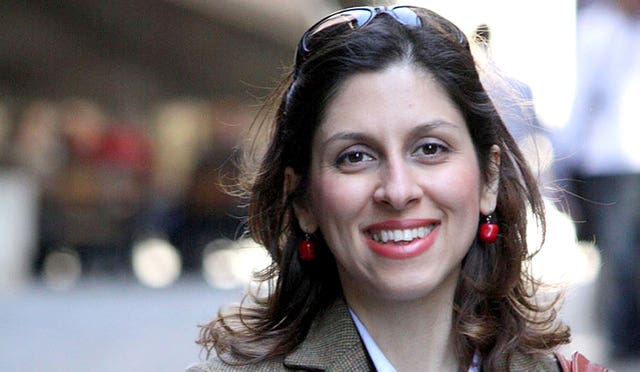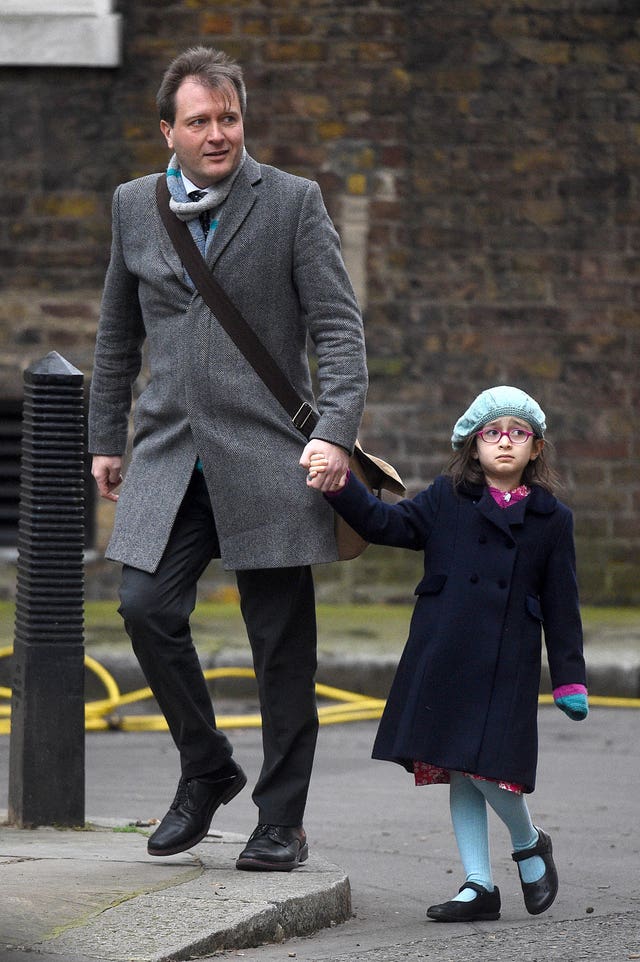
Nazanin Zaghari-Ratcliffe’s husband has said there was “no breakthrough” with Boris Johnson when they discussed efforts to free the British-Iranian mother from imprisonment in Tehran.
Richard Ratcliffe and their five-year-old daughter Gabriella met the Prime Minister in Downing Street over the charity worker’s detention, which continues after nearly four years.
The mother was visiting her parents with her then-baby daughter when she was arrested and accused of spying, which she and the UK Government vehemently deny.
Any optimism over Ms Zaghari-Ratcliffe’s chances of freedom has been dampened by the soaring tensions with Iran provoked by the US killing of its top general, Qassem Soleimani.
But Mr Ratcliffe continued to apply the pressure during a meeting with Foreign Secretary Dominic Raab and the PM, who he has criticised for his handling of the charity worker’s case and potentially worsening her plight.
Clutching his daughter’s hand, Mr Ratcliffe told reporters: “In truth, no breakthrough,” when exiting the meeting.
He said he had urged the PM to be “brave” in his dealings with Iran, and said he was convinced Mr Johnson is “personally committed” about her situation – though he did not apologise for his past mistakes.

But the father added: “Sympathy isn’t enough to get us out of this.”
He said a “gap” remains between his sense that the Government must be “tough with Iran”.
“I don’t think I have come away thinking Nazanin is coming out tomorrow or even next week, and I will think carefully about what I tell her on the phone on Saturday about where the hope is to come,” Mr Ratcliffe added.
Ms Zaghari-Ratcliffe, a 41-year-old mother who lived in London, is serving a five-year sentence after being arrested in April 2016, but their are fears Iran could bring further charges.
Her family and the UK Government have always maintained her innocence and she has been given diplomatic protection by the Foreign Office to apply extra pressure.

Gabriella, who recently returned from Iran to live with her father, was present in Thursday’s meeting, during which they gave the PM a wallet Ms Zaghari-Ratcliffe made. She was happy to see Larry the cat, but declined an apple juice from the PM’s aides.
The husband said it was clearly recognised in the meeting that his wife was being held hostage as a “chess piece”, but acknowledged the UK was walking a diplomatic “tightrope”.
One issue inflaming tensions with Tehran is the £400 million-dispute between the UK and Iran over a deal for Chieftain tanks struck in the 1970s.
The PM was clear this “should be resolved as soon as possible”, Mr Ratcliffe said.
Mr Johnson has been persistently criticised for wrongly claiming, when he was foreign secretary, that Ms Zaghari-Ratcliffe was training journalists at the time of her arrest.
Four days later she was summoned to an unscheduled court hearing during which Mr Johnson’s comments were cited as proof she was engaged in “propaganda against the regime”.

Mr Ratcliffe said they did not discuss the past in their latest meeting and wanted to keep the focus on efforts going forward.
His wife is among as many as five people with dual British-Iranian nationality, or with UK connections, believed to be in prison in Iran.
There are some hopes that diplomatic tensions could ease between London and Tehran if a long-running the financial dispute is settled.
This week the Court of Appeal has been sitting in relation to a preliminary issue on interest on the outstanding sum, but the full dispute is expected to return at a later date.
But Iran’s ambassador to the UK, Hamid Baeidinejad, has placed significance on the current proceedings.
He tweeted that if a portion of the debt is assigned to Tehran then it will mean “the legal process of the case is coming to an end and there will be no excuse for default” from the Government.
The Prime Minister’s official spokesman said Downing Street “does not recognise any links” between the imprisonment and the cancelled deal for 1,500 Chieftain tanks made with pre-revolutionary Iran in the 1970s.
Labour MP Tulip Siddiq, however, urged the Government to help free her constituent and end its “unforgivable” behaviour by returning the outstanding sum.
But Leader of the House Jacob Rees-Mogg said the issue is “extraordinarily difficult”.
“The British Government cannot and must not pay or appear to pay, either in fact or reality, money to allow people who have been illegally detained to be released,” he told the Commons.


Comments: Our rules
We want our comments to be a lively and valuable part of our community - a place where readers can debate and engage with the most important local issues. The ability to comment on our stories is a privilege, not a right, however, and that privilege may be withdrawn if it is abused or misused.
Please report any comments that break our rules.
Read the rules here